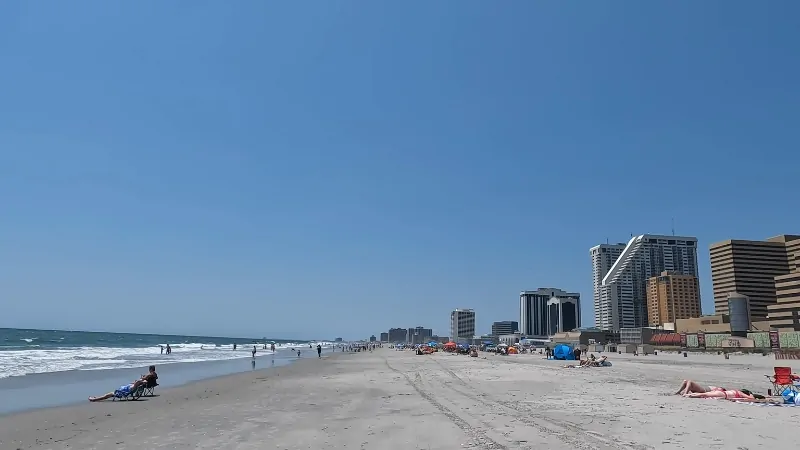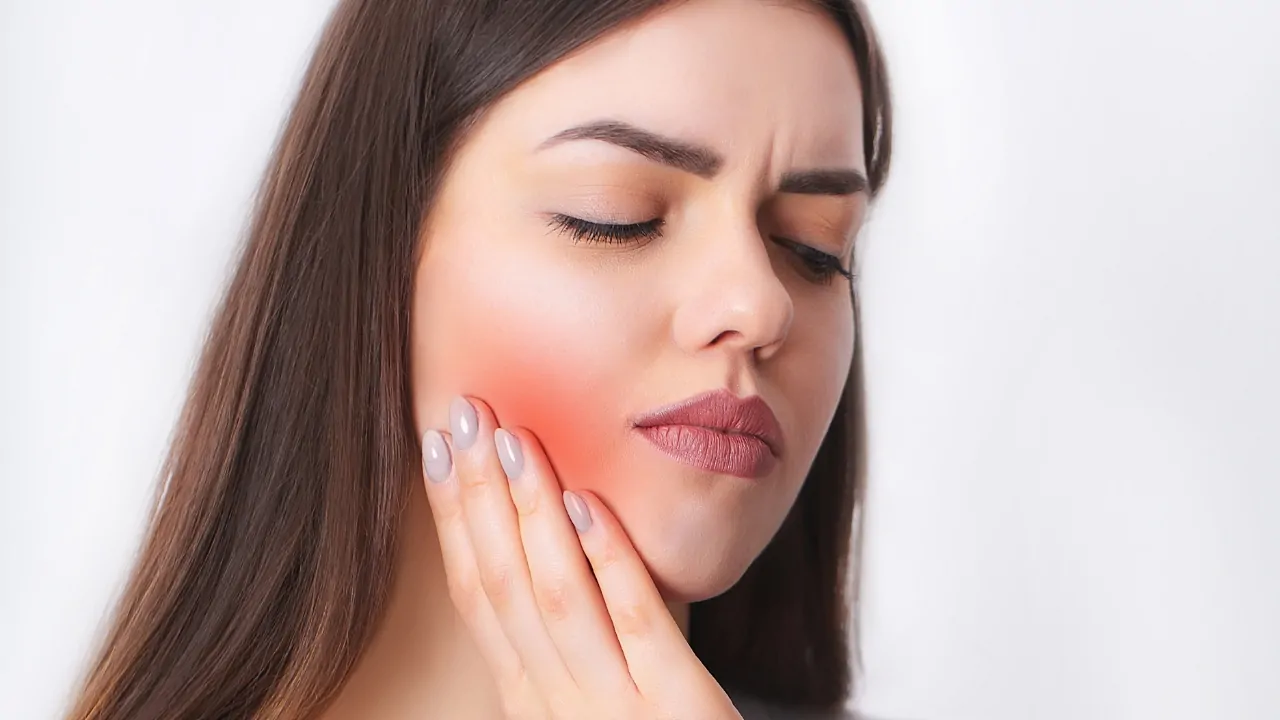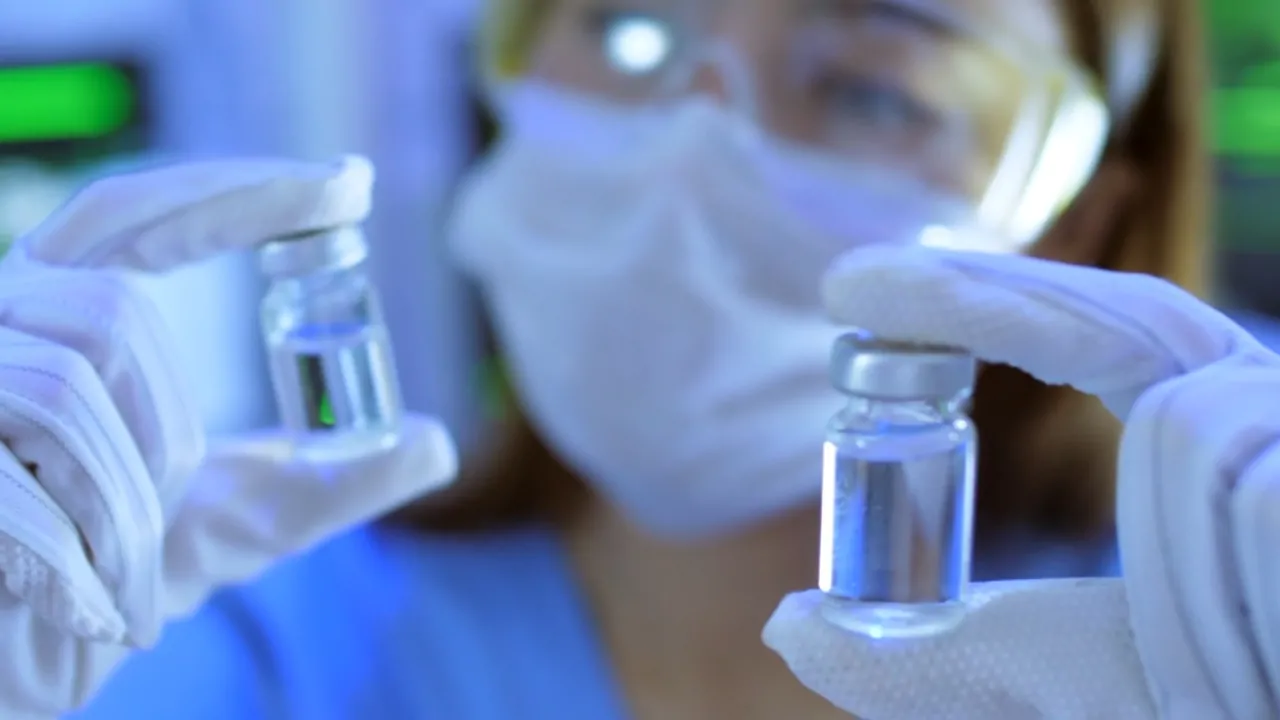Atlantic City visitors most often run into heat and dehydration, rip-current incidents, alcohol-related ER visits and falls, GI upsets/foodborne illness, respiratory irritation from casino smoke, jellyfish stings, sunburn, STI concerns, seasonal respiratory infections, and gambling-linked mental-health stress.
That’s not guesswork: local lifeguards reported 135 rescues over the 2025 Independence Day weekend and typically 1,000+ rescues each summer; AtlantiCare handled ~97,000 emergency-department visits in 2024; and New Jersey’s helpline for gambling problems reports a ~277–300% surge in calls since 2018, with high-risk prevalence around 5.6–6%, roughly 3× the U.S. average.
Table of Contents
Toggle1. Heat Exhaustion & Dehydration
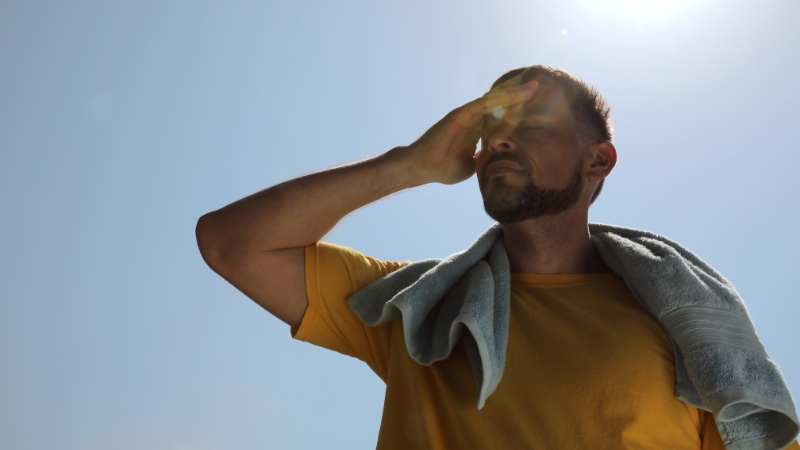
Long summer days on the Atlantic City Boardwalk can quickly turn dangerous when high temperatures mix with alcohol, physical activity, and inadequate hydration. According to the New Jersey Department of Health, there were 825 heat-related emergency department visits statewide in 2022, with most cases occurring between June and August.
The CDC’s 2023 heat illness surveillance also showed a significant increase in ER visits during that year’s warm season, especially among adults aged 18–64. Tourists often underestimate how quickly heat stress can develop when walking miles of boardwalk, lounging on the beach without shade, or consuming alcohol, which accelerates fluid loss.
Carrying electrolyte drinks, wearing light clothing, and checking the NJ heat advisory map before heading out can reduce your risk.
Factor
Risk Level
Supporting Data
Daytime temperature > 90°F (32°C)
High
NJDOH: Most heat-related ED visits occur on days above 90°F
Alcohol consumption
High
Alcohol increases dehydration and impairs body cooling
Time spent in direct sun (>2 hrs)
Very High
CDC: Prolonged sun exposure linked to the majority of ER cases
2. Rip Currents & Surf Injuries
Atlantic City’s beaches are a major draw, but rip currents remain one of the leading hazards for swimmers.
According to Shore Local Newsmagazine, the Atlantic City Beach Patrol performed 135 rescues over the July 4th weekend in 2025 alone, with a seasonal total that typically exceeds 1,000 rescues.
The NOAA reports that rip currents cause more than 80% of all lifeguard rescues nationwide. Many incidents occur when visitors swim outside guarded areas or during red-flag conditions.
Locals recommend swimming only where lifeguards are present, asking them about water conditions before entering, and remembering that if caught in a rip current, you should swim parallel to shore until free of the current.
Year
Total Rescues (AC)
Peak Month
% of Rescues Caused by Rip Currents
2025
1,000+ (projected)
July
80%+
2024
~950
July
82%
National Avg.
N/A
N/A
80%+ (NOAA)
3. Alcohol-Related Injuries & Falls
Atlantic City’s nightlife and casino culture contribute to a steady number of alcohol-related injuries. Visitors often combine day drinking on the beach with late-night bar hopping, leading to falls, dehydration, and impaired decision-making.
The National Highway Traffic Safety Administration (NHTSA) reports that impaired driving remains one of New Jersey’s top highway safety concerns, especially during holiday weekends.
In addition to vehicle risks, casinos and bars see incidents involving falls down stairs, slip-and-fall accidents, and altercations fueled by intoxication. To stay safe, alternate alcoholic drinks with water, eat before drinking, and use rideshare services instead of driving.
Incident Type
Common Location
Contributing Factors
Preventive Measures
Falls/injuries
Casino floors, boardwalk bars
Alcohol impairment, wet floors
Hydrate, wear stable footwear
DUI arrests
Roadways near casinos
Nightlife events, holidays
Use rideshare, public transport
Disturbances
Bars/clubs
Overconsumption, crowding
Pace drinking, avoid conflicts
4. Foodborne Illness & GI Upsets

From all-you-can-eat buffets to seafood stalls, Atlantic City offers a huge variety of food – but mass-service dining can carry risks.
According to the NJ Department of Health, outbreaks are more common during warmer months when bacteria multiply faster, and raw or undercooked seafood is a frequent culprit.
Visitors have reported gastrointestinal issues after eating improperly stored shellfish or food from unregulated vendors.
To lower your risk, choose reputable restaurants, check food temperature at buffets, and avoid raw oysters if you have a compromised immune system. Quick reporting to local health authorities can help prevent larger outbreaks.
Food Type
Risk Factor
Peak Season
Prevention
Raw shellfish
Vibrio bacteria
Summer
Eat cooked only
Buffet items
Cross-contamination
Year-round
Fresh plate per trip
Festival foods
Poor temp control
Summer/fall
Buy from licensed vendors
5. Secondhand Smoke in Casinos
Atlantic City remains one of the few U.S. casino hubs where smoking is still allowed on parts of the gaming floor.
According to the NCBI, in smoking areas, with some casinos exceeding safe cardiovascular exposure levels after just two hours.
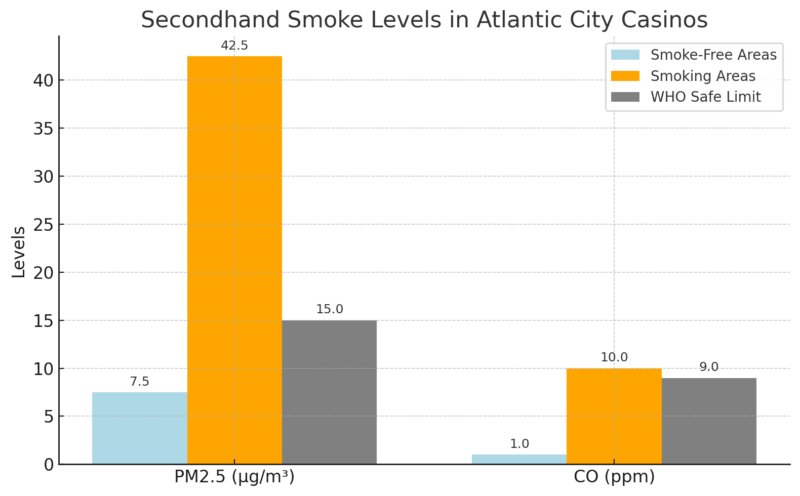
An NJ GASP advocacy review found 93% of smoking casinos surpass the World Health Organization’s safe limits. Visitors with asthma, heart conditions, or other respiratory sensitivities should stick to smoke-free areas and take breaks outdoors.
6. Jellyfish & Marine Stings
July 2025 saw increased jellyfish sightings along the Jersey Shore, according to 6abc Philadelphia, prompting lifeguards in nearby Ventnor to issue public warnings. Most stings cause temporary pain and skin irritation, but severe allergic reactions can occur in sensitive individuals.
The safest response is rinsing the area with seawater (not freshwater), scraping tentacles off with a card, and seeking medical help if symptoms escalate. Tourists should check daily lifeguard advisories before swimming.
Risk Level
Common Months
Symptoms
First Aid
Moderate
July–August
Pain, redness
Rinse with seawater
High
Late July spikes
Intense burning, swelling
Remove tentacles, seek care
7. Severe Sunburn & Eye Irritation
🌞 Protect yourself from Harmful Sun Rays 🌞
We all love a sunny day, but did you know that too much sun can be harmful? Overexposure to UV radiation can lead to painful sunburns, skin cancer, premature skin aging, eye damage, and even suppress your immune system. Kids are… pic.twitter.com/jnigFgUJ6a
— U.S. EPA Northwest Region (@EPARegion10) July 23, 2025
High UV levels in Atlantic City can lead to sunburn in less than 20 minutes during midday hours. According to CBS News, extreme heat waves in recent years coincided with crowd surges on local beaches, increasing the number of severe burns treated by lifeguards and first aid stations.
Photokeratitis, or “sunburn of the eye,” can also occur without proper UV protection.
Broad-spectrum SPF 30+ sunscreen, reapplied every two hours, and sunglasses with UV400 protection are non-negotiables for beachgoers.
UV Index
Burn Time Without Protection
Risk Level
Precaution
6–7
25 minutes
High
SPF 30+, sunglasses
8–10
15–20 minutes
Very High
SPF 50, wide-brim hat
11+
<10 minutes
Extreme
Avoid midday sun
8. STIs & Testing Access
Tourism brings diverse crowds, and with it, an increased risk of sexually transmitted infections. The Atlantic County Division of Public Health lists multiple free and low-cost clinics offering testing for chlamydia, gonorrhea, HIV, and syphilis.
Risk rises during high-traffic weekends when nightlife is at its peak. Visitors should practice safe sex, consider PrEP for HIV prevention if relevant, and know where to access confidential testing after their trip.
Resource
Location
Services
Contact
Atlantic County STD Clinic
Northfield
Free testing, treatment
County website
Planned Parenthood
Nearby cities
Testing, contraception
pp.org
9. Seasonal Respiratory Infections
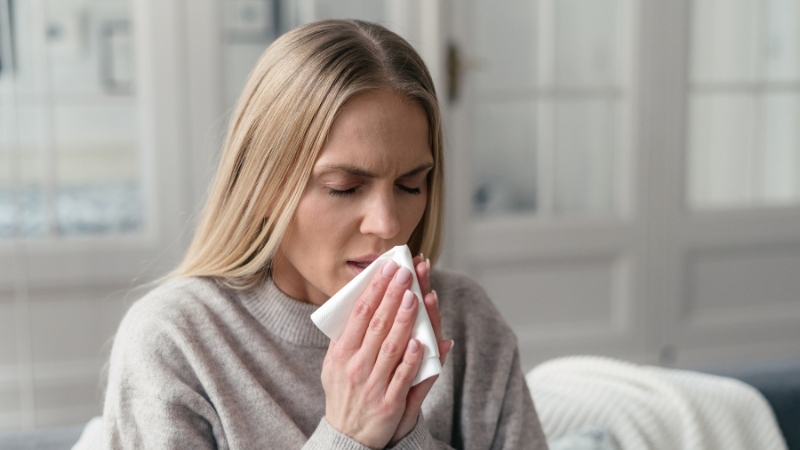
Large conventions and casino events pack thousands into enclosed spaces, creating ideal conditions for flu, COVID-19, and other respiratory viruses.
AtlantiCare, which handles nearly 100,000 emergency visits annually, sees spikes in respiratory complaints during winter and early spring. Travelers with chronic conditions should time visits outside peak flu season, get vaccinated beforehand, and consider masking indoors during outbreaks.
Season
Common Viruses
Risk Level
Prevention
Winter
Influenza, RSV
High
Vaccination, mask indoors
Spring
COVID variants
Moderate
Hand hygiene, ventilation
10. Gambling-Linked Stress, Anxiety & Sleep Loss
While most tourists gamble for entertainment, for some, prolonged casino sessions can trigger financial stress, anxiety, and insomnia. NJ Spotlight News notes that New Jersey’s high-risk gambling rate is around 5.6–6%, roughly triple the national average.
According to the Council on Compulsive Gambling of NJ, calls to the 800-GAMBLER helpline have increased 277–300% since 2018, with more young adults seeking help. Building in non-casino activities, setting a clear budget, and prioritizing rest can help maintain both mental and physical well-being.
If you enjoy gaming, set a clear budget and time limit before you start, and mix in non-casino activities to give your mind and body a break. Online platforms such as Nightrush, which also offer casino-style entertainment that you can enjoy at your own pace, often with tools to help manage play responsibly.
Indicator
NJ Rate
U.S. Average
High-risk gambling prevalence
5.6–6%
~2%
Helpline call volume increase (since 2018)
+277–300%
N/A
Know Before You Go
Guarded beaches and season start: The Atlantic City Beach Patrol typically begins full seasonal coverage in late May. If you’re visiting early in the season, check the official ACNJ.gov updates to confirm which beaches are staffed with lifeguards before you swim.
Where to get care: The AtlantiCare emergency department network operates 24/7 and handles roughly 100,000 visits each year across locations in Atlantic City, Galloway, and Hammonton — so visitors have access to immediate medical attention if needed.
Seasonal Risk Calendar – Atlantic City
Month
Heat / Dehydration
Rip Currents
Jellyfish
Flu / COVID
Big Events = Alcohol Risk
May
▲ Low
▲ Low (early season)
– None
– None
▲ Low (holiday weekends)
Jun
▲▲ Moderate
▲▲ Moderate
▲ Low
– None
▲▲ Moderate
Jul
▲▲▲ High
▲▲▲ High
▲▲ Moderate
– None
▲▲▲ High (peak tourism)
Aug
▲▲▲ High
▲▲▲ High
▲▲▲ High
– None
▲▲ Moderate
Sep
▲▲ Moderate
▲▲ Moderate
▲ Low
– None
▲ Low
Oct–Apr
– None
– None
– None
▲▲ Moderate (indoor season)
▲ Low (conventions)
How to read the ▲ symbols:
Notes
- Heat and rip currents peak in July–August, aligning with the busiest beach season.
- Jellyfish activity tends to rise mid-to-late summer, with August often seeing the highest stings.
- Flu/COVID risk is minimal during summer but increases during colder months when events move indoors.
- Alcohol-related incidents correlate with large gatherings, July holiday weekends, and big conventions see the sharpest spikes.
Bottom Line
Atlantic City offers an unbeatable mix of beaches, entertainment, and nightlife, but like any busy tourist hub, it comes with risks that smart visitors can plan for.
Knowing the most common health issues ahead of time means you can enjoy the Boardwalk, the surf, and the casinos without your trip being cut short by heat exhaustion, a jellyfish sting, or an unexpected ER visit.
Check beach safety updates, pace your alcohol intake, protect yourself from the sun, set boundaries for your time, and spend time in the casinos.
With a little preparation and awareness, you can focus on what you came for: making the most of your time in one of the East Coast’s most iconic destinations.
Related Posts:
- 11 Most Common Reasons for Divorce - Why Marriages End
- Most Common Birth Defects in the US. – Regional Data…
- What Is The Most Common Blood Type In The United States?
- 11 Most Common Preventable Diseases Affecting Older…
- How Common Are Hazel Eyes Compared to Other Eye Colors?
- How Common Is Postpartum Depression? U.S. Statistics…


